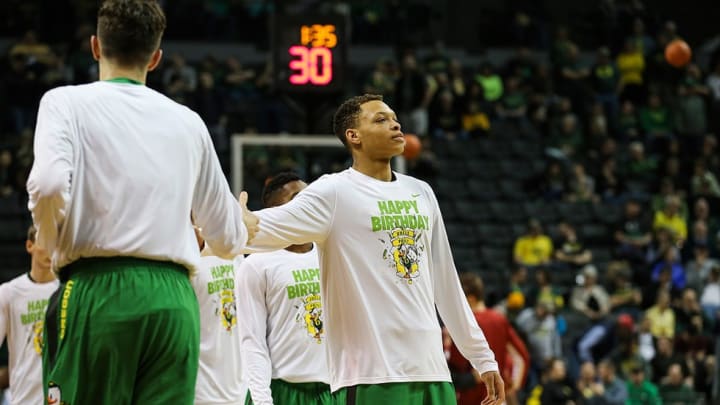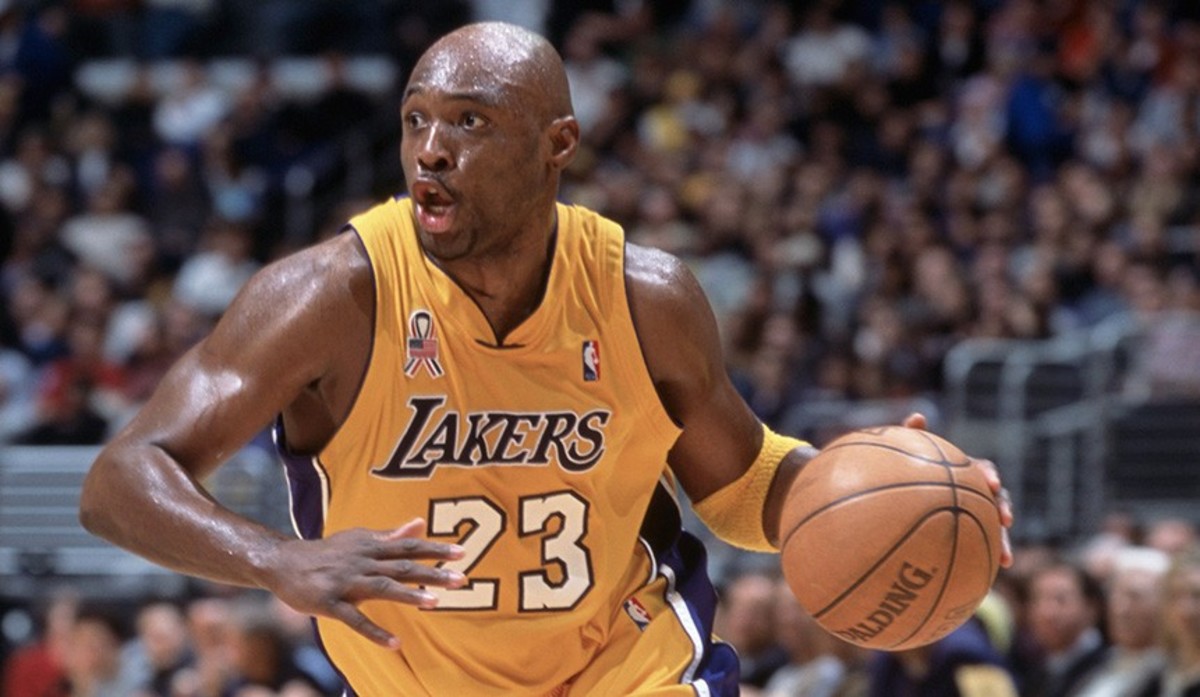Oregon walk-on Phil Richmond shares a lot with his father, NBA legend Mitch. Most importantly: a coach

SPOKANE, Wash. — It's not unusual for the son of an NBA All-Star to play college basketball, but Phil Richmond's path to the Oregon Ducks has been unique. He's gone from high school to prep school to junior college to Oregon manager before walking on to the No. 1 seed playing in the Sweet 16. Richmond, though, is happy to be different.
Phil Richmond is the son of Mitch Richmond, a six-time all-star shooting guard who played 14 years in the league and retired after winning a title with the Lakers in 2002. Mitch had his own winding path to the big-time: A Fort Lauderdale, Fla., native, he started his college basketball career at Moberly (Mo.) Area Community College, where Dana Altman was in his second season as the coach. During the next two years, Altman likes to say, "Mitch won 69 games, and I found a way to lose nine." Then both went to Kansas State, where Altman became an assistant under Lon Kruger and Mitch helped the Wildcats to a 45–20 record and back-to-back NCAA tournament berths—including an appearance in the 1988 Midwest Regional final, where they lost to in-state rival and eventual national champion Kansas—while scoring 1,327 points, a school record for a two-year player. Two seasons after Mitch graduated, Kruger left for Florida and Altman took over. From 1989-90 to '93-94, Altman compiled a 68–54 record before moving to Creighton for the 1994–95 season.
As Altman built Creighton into a one of the nation's most respected mid-major programs, Richmond dominated in the NBA, including a stretch in which he averaged at least 21 points for 10 consecutive seasons. Though his four children grew up in NBA gyms, Mitch, who is now in his first year as a special assistant for St. John's under former Warriors teammate Chris Mullin, never wanted to push his kids into basketball. He mostly kept quiet when Phil started to play as a young child. He jokes now that his plan backfired: When Phil got to Calabasas (Calif.) High and realized he wasn't as far along, skill-wise, as other kids, Phil asked his dad why Mitch hadn't demanded more from him.
Phil had, by his own account, an average high school basketball career. It wasn't until 2012, when he enrolled in a postgraduate program at Impact Basketball Academy, a prep school in Las Vegas, that he realized, "I have to be my own person. I'm not my dad, and that's O.K." Mitch and his wife, Juli, have three other children, none of whom played basketball seriously: Tearra (27) played high school ball in Atlanta but had to quit when she found out she had a heart murmur, Jerin (21) is a film student at Arizona State and Shane (16) hasn't played competitive basketball or football in a year at Calabasas High. It's not what Mitch had expected.
After Impact, where he averaged 12 points a game, Phil, a 6'4" guard, spoke with a handful of Division III schools. He wanted to play at Marywood University in Scranton, Pa., but wasn't wild about the $46,000 per year price tag. Convinced that basketball wasn't in his future, he wound up at Santa Barbara City College, but didn't play hoops. He spent two years getting his associate's degree after which his dad called and encouraged his son not to give up on his basketball dream.
"My dad was all for it," Phil says. "He's always pushing me to play hard, to go after stuff I want. He actually put the idea in my head that I could do it."

Getty Images file
Mitch knew just the place for his son: Oregon, playing for his old coach. Through the years, Mitch and Altman had kept in touch. Phil describes his father as "really fond of Dana, because they worked together so well." Phil met Altman for the first time in 2014, when Mitch was inducted into the Naismith Hall of Fame and Altman attended the ceremony. It was a forgettable conversation—Phil says they exchanged pleasantries but "I didn't really get a good feel for who he is"—but the trip back to California was memorable. That's when Mitch, who knew his son wanted to be a coach someday, suggested Phil move to Eugene to see if he could manage, or possibly walk on, under Altman.
Says Mitch, "I told him it's not about the minutes, it's about the experience. I knew Altman would take care of him ... but he was so shy he didn't ask Dana."
Phil talked with Oregon director of operations Josh Jamieson and Altman, who told Phil he'd better be ready to spend a lot of hours doing unglamorous tasks if he wanted to manage. He enrolled for the 2014–15 season and got a behind-the-scenes look at Division I life. "Actually, I was really happy," he says of last season. "It teaches you time management, and gives you an appreciation for everything. But wiping the floor is pretty hard, and rebounding gets tiring. And you don't even think about the jerseys, the gear. We're on TV a lot, so organization, and making sure you're promoting Nike the right way, is big."
As the Ducks compiled a 26–10 record and reached the round of 32 in the NCAA tournament, Phil watched Altman, one of the most respected teachers in the game. He studied how Altman broke down scouting reports and always gave his players solutions to on-court problems, instead of just screaming at them. And in his free time, as Phil dreamed about playing for a Power Five program, he went to the Oregon student rec center to practice threes against slack pick-up defenses.
"He dominated there," says Oregon senior forward Dwayne Benjamin, Phil's closest friend on the team. "I told him he should walk on. I mean, that's why he was the manager last season, to be around the game he loved so much." Why not get a little closer to the action? Benjamin reasoned.
When he finally worked up the courage to ask Jamieson and Altman what they would think of him trying out, they told him as long as he could prove he belonged, they'd have no problem with it. Phil participated in fall practices—"Honestly, I thought I was in pretty good shape, but the sprints were hard," he says. On Oct. 12, he was officially added to Oregon's roster as a guard.
Transition from manager to teammate has been a work in progress, especially because he hadn't played team basketball since 2012. He has played in just three games, including three minutes in last week's 91–54 thumping of Holy Cross in Oregon's NCAA tournament opener.
"At the D-I level, I'm not really sure I have a specialty," says Phil, who hasn't scored or grabbed a rebound this season. "I still shoot threes." Benjamin interjects to say that this doesn't happen that often in practice, because the Ducks swarm the perimeter.
Phil lives with Oregon manager Ben Hartmann, but doesn't think Hartmann has any plans to walk on for the Ducks next. Asked if any other managers or equipment guys have approached Altman about changing their roles, the sixth-year Oregon coach smiled. "Well, the door's always open," he says. "But no, I think the rest of them probably feel pretty comfortable ... Phil's done a great job. He's all about the team, a very unselfish young man."
Last weekend, Mitch was visiting his mother in Florida as the Ducks beat Holy Cross and Saint Joseph's to reach the Sweet 16, with his phone buzzing from texts from elated friends and family members who saw Phil celebrating on TV. But when Oregon takes on No. 4 seed and defending national champion Duke on Thursday in Anaheim, Mitch will be there. "For me, it's exciting that he gets to go through that journey with a coach who really helped in my development and who I love dearly," Mitch says. "When I talk to him now, I can tell this season, being part of the team, has helped him get some confidence. He's becoming a man."
That Phil barely plays matters not to Benjamin, the Ducks' sixth man who averages 22.3 minutes and 8.1 points per game off the bench. Everyone has an important part in this ride, he says, and Oregon wouldn't be in the regional semifinals without every piece, from leading scorer Dillon Brooks to Phil to the team's trainers. But knowing Phil's journey makes it a little cooler.
"We always talk about seeing him living out his dream," Benjamin says. "And I know he feels the same way for me as I do for him: Every time he gets a chance to play, it's special for everyone on the bench."
